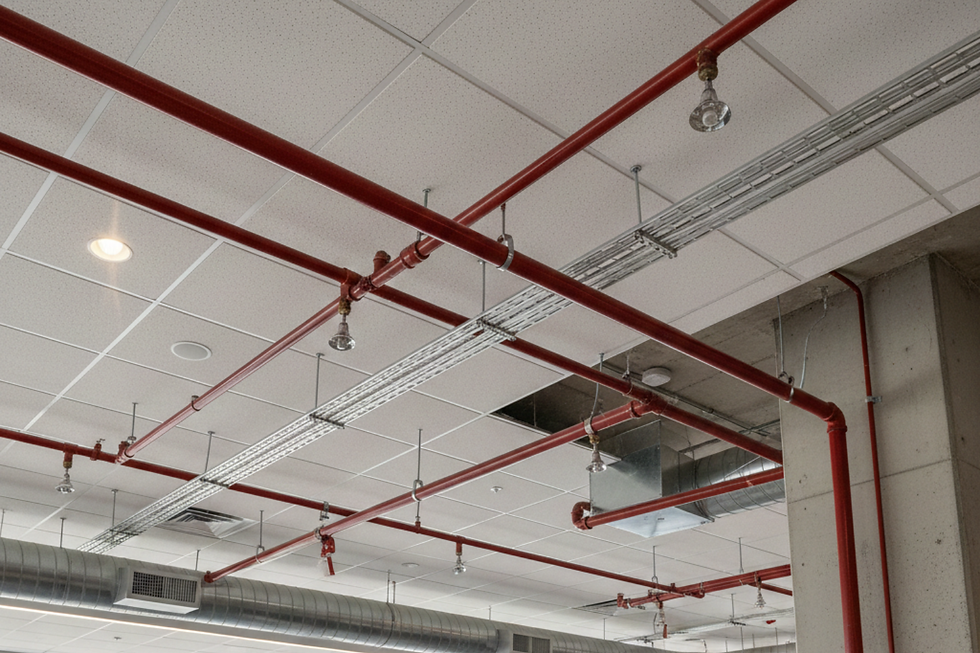Signs It’s Time to Service Your Fire Sprinkler System
- firejaime
- Jun 10, 2025
- 3 min read
Fire sprinkler systems play a crucial role in protecting lives and property. They can extinguish fires or contain them until the fire department arrives. However, like any other system, it requires regular service and maintenance. Recognizing the signs that it’s time for a service can be the difference between a near-miss and a disaster.
Understanding Fire Sprinkler Service
Fire sprinkler service encompasses various activities such as inspections, maintenance, and repairs. These should be performed by certified professionals to ensure the system remains operational. Regular servicing helps identify potential issues before they become major problems, ensuring that your fire sprinkler system works efficiently when needed.

A well-maintained fire sprinkler system can save lives and minimize property damage. According to the National Fire Protection Association (NFPA), properly functioning systems can reduce fire damage by up to 80%.
Indications of Malfunctioning Components
Each component of a fire sprinkler system plays a vital role. If any of these components malfunction, the entire system could fail. Signs indicating that servicing is needed include:
Corrosion: Over time, pipes can corrode, especially if they’re made from metal. Corrosion can lead to leaks, causing the system to lose pressure and effectiveness.
Leaking Water: If you spot water pooling near your sprinkler heads or piping, it may indicate a leak that needs immediate attention.
Visible Rust or Mold: These substances can accumulate around sprinkler heads and pipes. They can pose a significant threat to the system's integrity.
Regular inspections can help identify these warning signs. Slow leaks can lead to extensive water damage and mold growth, which can turn into costly repairs.

Neglected Routine Inspections
Failing to perform routine inspections is one of the primary reasons fire sprinkler systems fail. NFPA mandates that commercial properties undergo inspections at least once a year. However, residential systems also benefit from similar regular check-ups.
Indicators that you may need more frequent servicing include:
Local climate changes: Temperature fluctuations can cause expansion and contraction in pipes, leading to potential failures.
Building renovations: If there’s been recent construction or remodeling in your facility, the sprinkler system may require reevaluation. New walls or equipment can obstruct sprinkler heads, limiting effectiveness.
Increased occupancy: A change in the number of occupants can increase fire risk. If you've changed your building's purpose or occupancy, servicing may be necessary.
Remember that while you can observe your system visually, it’s essential to have professionals perform thorough checks periodically.

Unusual Sounds or Smells
If your fire sprinkler system makes unusual sounds or emits strange odors, it's time for a service. Strange noises can indicate air bubbles in the system or other mechanical issues that require professional attention.
Additionally, if you smell mold or mildew, it might suggest leaks or that the system has been sitting idle for too long, allowing water to stagnate.
In both cases, do not ignore these warning signs. They may signal a failure that could prevent the system from functioning correctly in an actual emergency.
Expired Components
Each component within your fire sprinkler system has a lifespan, and some may require periodic replacement. Check the following to maintain your system effectively:
Sprinkler heads: Most sprinkler heads have a life expectancy of about 50 years. If they are discolored or damaged, consider replacement.
Valves: Corrosion or leaks around valves indicates they may be near failure.
Control panels: These should be regularly updated to ensure they remain compatible with the latest technology.
Routine maintenance helps identify components that need replacement and prolongs the life of your fire sprinkler system.
Importance of Professional Inspections
While regular self-inspections are beneficial, hiring a professional for a comprehensive inspection is essential. Professionals possess the knowledge and technical training necessary to identify hidden issues that untrained individuals might overlook.
They will ensure that:
Your system complies with local regulations.
All parts function correctly, from the water supply to the last sprinkler head.
Any problems found are resolved promptly.
To find a service provider near you, consider searching for "fire sprinkler service near me."
Final Thoughts on Fire Sprinkler Maintenance
Maintaining a fire sprinkler system is vital for safety and compliance. Recognizing the signs that it’s time for servicing can prevent catastrophic outcomes. By staying vigilant and scheduling regular inspections, you can protect your property and ensure that your fire sprinkler system functions correctly when it's needed most.
Don’t wait for problems to arise. Make fire sprinkler servicing a priority. Regular check-ups and immediate attention to concerns can save lives and property.
Finding a reliable service provider can help you maintain peace of mind. For further assistance in ensuring your system is up to date, explore fire sprinkler service options here.




Comments